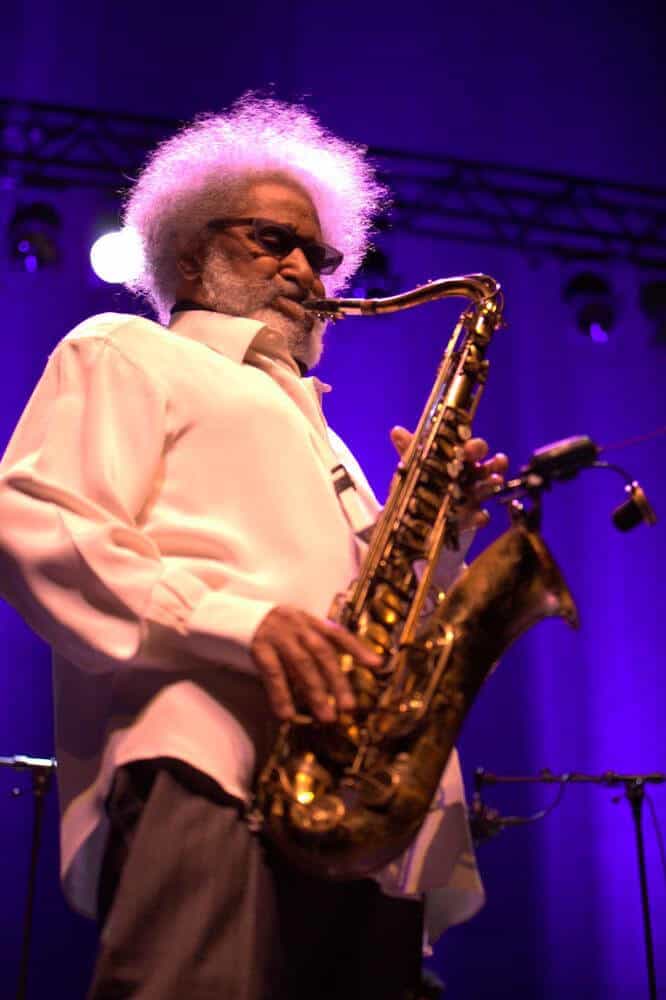On January 10, I stayed home and near the stereo to catch as much of WKCR’s annual Max Roach birthday broadcast as seemed reasonable. After so many fantastic records from the Charlie Parker Quintet and the Max Roach/Clifford Brown Quintet, the DJ started spinning Max Roach Plus Four, pretty much the Roach/Brown Quintet but with Kenny Dorham replacing the at the time recently departed (and gravely missed) Clifford Brown.
Brown’s death was one of the heartbreaking tragedies in jazz, but in pure, plain musical terms, hearing Dorham in this group was never a letdown. An underrated trumpeter among fans but admired by musicians, Dorham, as a young man, was a terrific partner to Parker and went on to play imaginative, deeply intelligent hard bop for decades. And here he was, in arguably the most important hard bop group of all time, holding his own with the titanic tenor saxophonist Sonny Rollins. So I was digging this record, a quintet of amazing musicians (also with Ray Bryant and Bill Wallace taking turns at the piano and bassist George Morrow) playing a selection of material that includes George Russells’ hip, modernist “Ezz-thetic,” “Body and Soul,” “Woody ’n’ You,” and Ellington’s “It Don’t Mean a Thing (If It Ain’t Got That Swing).”
Then it hit me—one of the reasons I’m drawn to the old records (this one was released in 1956), despite my constant advocacy for contemporary jazz and my railing against the too-respectful ancestor worship that has been a constant hindrance to the music, is that you can hear the greats on them; the great musicians, the great bands. And in the contemporary scene, there’s no great bands anymore, and though there are plenty of great musicians, there seems so few opportunities to express their possibilities. It’s not that the musicians were bigger back then, but rather, to steal a line, the jazz world is smaller.
Musically, it’s just the opposite. The great revolution in jazz was planted by Parker and the be-boppers, but it exploded in 1959 and has been ongoing since. That year the records included Kind of Blue, Free Jazz, Mingus Ah Um, and Time Out, the jazz equivalent of the Big Bang. We’ve been living in the music’s expanding universe for 60 years now, and jazz has incorporated free playing and the avant-garde in general, rock, funk, soul, electronics, hip hop, world musics, microtonality, and it just keeps going on. But all this music is contained within a social and economic universe that is only a tiny fraction of what it was when Max Roach went back into the studio and did the best thing he could do to honor Clifford Brown, which was to keep making music.
Rollins is the only musician left from that Max Roach session, 90 years old as of this writing. After a year that has seen so much death, and the loss of so many jazz titans (Chick Corea and Milford Graves being the most recent), I know I’m not alone in hoping to not see his name trending on Twitter because it will likely mean one thing… And then who’s left after Rollin? Herbie Hancock? Roscoe Mitchell? It’s hard to see such figures go, even more so because of how much they’ve done for the world (I include Lawrence Ferliinghetti, who’s death at 101 was announced the day I finalized this column, he dug jazz and had great poems that expressed what he found in the music, like “Sometime During Eternity…”, from Coney Island of the Mind), and the death of jazz greats also means the final disappearance of a world that exists only in memories and history books. One where Rollins could grow up in a Harlem and New York City where jazz was a cultural lingua franca, where he could learn from and play with Coleman Hawkins, Thelonious Monk, Parker, Jackie McLean, and Miles Davis. He, and other young musicians around the country, could learn the basics in high school band classes (that element is a staple of the biographies of so many of the greats). The world was a jazz world.
The music is a niche now. Institutions and academic programs have stepped in to keep it alive, but institutional support in general and pedagogy in particular means a shadow conformity, if not something more explicit and pernicious—money comes in to departments and institutions, and how it is spend is a reflection of institutional values, the money becomes the way. The meanness of America has meant taking money away from public schools. If you’re not at a private school, or one in a wealthy zip code with an active PTA, you’re not likely to get quality music instruction before college. That already pre-selects the kids who might have a change to go to music school, even before the cost of college. Graduate school, which has become a prerequisite in a society that sees credentials as the single most important heuristic in professional life, further narrows the field, which has already been built on those who can most afford all the training, not on those who have the most musical talent and promise.
This is worthy of serious sociological study, and at the very least feels to me as a good explanation for something that has puzzled me over the past couple of decades, which is that the percentage of white jazz musicians has gone up drastically above the historical norm for a Black American music. They are fine, dedicated players, but it seems like they have the advantages of money and education that young Black men and women, who have the talent and even the interest, don’t share. Jazz is already economically impossible, taking on the economic burden of developing the skills to enter an impossible field seems insane, especially when a decent laptop and something like Reason+ ($199/year subscription) means you can become the next Flying Lotus, who is some kind of compositional and improvisational genius.
For musicians making jazz, it means hopping from gig to gig and running from session to session. No one can afford to maintain a working band except maybe Jazz at Lincoln Center (dedicated to repertory music), few have the time and money to latch onto a direction, like Rollins did, and keep driving down that road until time runs out. For every Henry Threadgill (now 77, two years younger than Chick), who has spent decades refining compositional ideas that organize explosiveness, creativity, and structure, there are ten musicians who put out one loose concept album after another. It’s hard to justify the costs of making a record these days, and starting with an extra-musical principle is a good way to argue for the sacrifice.
Unfortunately, there are no musical answers for this situation. The arts exist in society, and in America the trend everywhere, from MFA programs churning out the same bland storytelling to art galleries catering to the richest patrons and concert organizations run by the wealthy and the leisured, is to what John Cage said about opera, that it is a reflection of those in society who are materially well off. To change jazz we have to change the world. If we can.
Author
-

George Grella wrote the book on Miles Davis’ Bitches Brew. He write other stuff too. killyridols.substack.com/
View all posts
George Grella wrote the book on Miles Davis’ Bitches Brew. He write other stuff too. killyridols.substack.com/










